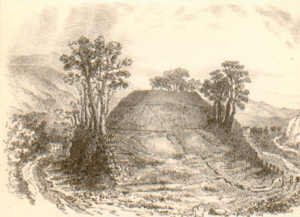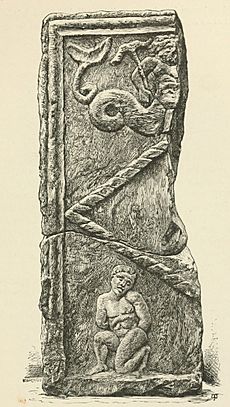Christian Maclagan facts for kids
Quick facts for kids
Christian Maclagan
|
|
|---|---|
| Born | 1811 Braehead, Denny
|
| Died | 10 May 1901 Ravenscroft, Stirling
|
Christian Maclagan (1811–1901) was a Scottish historian and early archaeologist. She was famous for collecting special copies, called rubbings, of ancient Celtic crosses and Pictish stones from all over Scotland. She also helped create a new way of digging up old sites, called stratigraphic excavation.
Even though she lost the use of her right hand, she made many drawings and paintings with her left hand. She worked to help people affected by poverty in Stirling. Christian Maclagan also supported women's right to vote, meaning she was a suffragist. She was even nominated to be one of Scotland's heroines at the National Wallace Monument. She died in Stirling when she was 90 years old.
Contents
Early Life and Education

Christian Maclagan was born in 1811 on her family's farm near Denny. Her father, George Maclagan, was a distiller and chemist. When she was young, her father and grandfather died. Her mother, Janet Colville, then moved the family to Stirling. They lived in a wealthy part of town called Pitt Terrace.
After her mother died in 1858, Christian became quite wealthy. Before this, she was very involved in helping her community. She started a Sunday School and helped pay for a library. She joined the Free Church of Scotland after a big event called the Disruption of 1843. In 1865, she even paid for a new church building. Later, she gave this church to the Church of Scotland.
Christian Maclagan was very well-educated for her time. She knew many languages, including Latin, French, Greek, and Gaelic. She also spoke some Italian and was a skilled artist.
Discovering Ancient History

Christian Maclagan was very interested in ancient sites and objects. She believed that large stone circles and tombs were once houses or forts. She thought that by studying these sites, archaeologists could find a hidden message. She published her findings, including rubbings from hundreds of ancient sites, at her own expense. She even dug at a place called the Mither Tap of Bennachie.
One of her main interests was in ancient Scottish towers called brochs. She was also one of the first people to use stratigraphic excavation. This is a special way of digging where you carefully remove layers of soil to understand how a site changed over time. She also had a secret method for making rubbings of carved stones. Her careful collection of rubbings of Celtic Christian crosses and Pictish symbol stones, started around 1850, is a very important part of her legacy. These rubbings include some of the earliest ones from Wemyss Cave.
Because she was a woman, Christian Maclagan could not become a full member of the Society of Antiquaries of Scotland. Instead, she was called a Lady Associate, like Queen Victoria. She felt this was unfair because she had been an antiquarian for a long time. She even threatened to leave the society because they read her papers without letting her explain her work. She couldn't officially publish her work with the society unless a man put his name on it. Because of this, she sent her rubbings to the British Museum. She remained a Lady Associate until she died.
The Smith Museum in Stirling has one of her models of a broch tower. Her work was sometimes overlooked because of the sexism of her time. One of her important discoveries, Livilands Broch, was even lost.
Remembering Christian Maclagan
In August 2019, a special plaque was put up by Historic Environment Scotland at 19 Clarendon Place, Stirling. This plaque helps remember Christian Maclagan and her important contributions.
See also
In Spanish: Christian Maclagan para niños
 | Emma Amos |
 | Edward Mitchell Bannister |
 | Larry D. Alexander |
 | Ernie Barnes |

